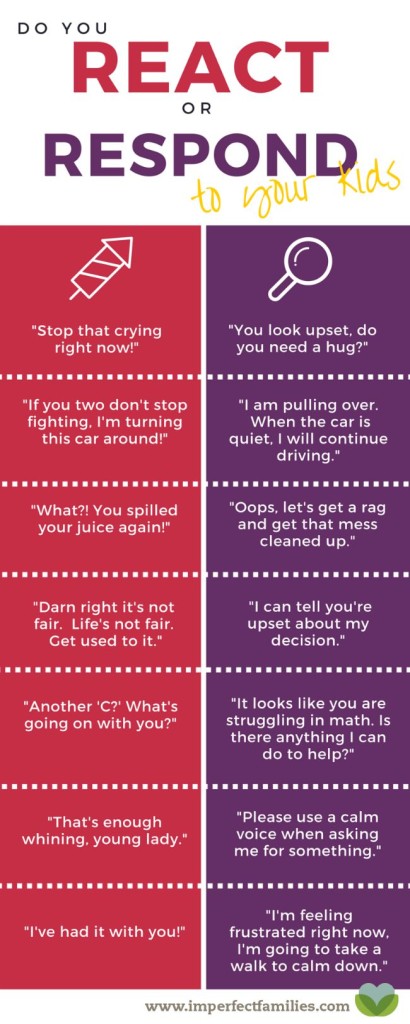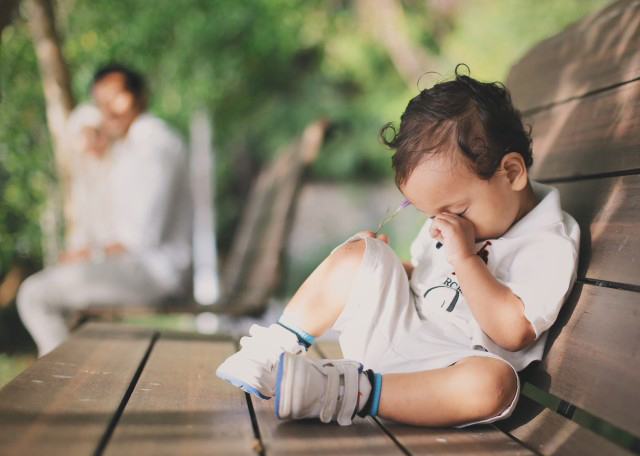Parenting Coach and Licensed Family Therapist, Nicole Schwarz, MA, LMFT, breaks down the in’s and out’s of reacting vs responding to your children.
Imagine that your oldest kids are fighting…again. Or, your youngest just spilled his juice box on the floor. Or, your daughter is whining that life is “not fair.”
What’s your knee-jerk reply?
Are you a yeller? Do you criticize? Overreact? Maybe you ignore, walk away or throw up your hands in frustration.
Or…do you inquire? Invite discussion and problem-solving? Make space for big emotions?
As we strive to have strong positive relationships with our children, it’s important to remember to Respond rather than React.
Reacting means that you meet your child’s emotionally-charged behavior with your own emotionally-charged reply. They are yelling, so you enter the conversation by yelling. They are screaming and having a tantrum, so you work hard to quiet them down and “get over” their fussing.
Responding, on the other hand, gives your child permission to express their big emotions, ideas, and feelings without criticism, shame or guilt. If your child is upset because something doesn’t seem fair, you let them be frustrated and express empathy. There’s no need to change your mind or try to fix the problem.
THIS IS NOT EASY.
This is a really tricky concept for a lot of parents. You are definitely not alone if you struggle in this area. Responding can feel ineffective, passive or too permissive at first.
In the long-run, however, the payoff is fantastic. Your children learn that it is safe to express their thoughts and feelings, they trust that you will help them process big emotions, and you may feel less pressure to intervene right away or change your mind.
If you’re a “react-er,” it may take time for this to become more natural. That’s ok. As you go through your day, look for times to respond rather than react. If you slip-up and react, give yourself permission to try it again. It’s not a sign of weakness to say, “Wait, what I meant to say was…” Let your children know that you are not perfect either!
REACT VS. RESPOND
Here some examples of reacting vs. responding:
“Stop that crying right now!” vs. “You look upset, do you need a hug?”
“If you two don’t stop fighting, I’m turning this car around!” vs. “I am pulling over. When the car is quiet, I will continue driving.”
“What?! You spilled your juice again!” vs. “Oops, let’s get a rag and get that mess cleaned up.”
“Darn right it’s not fair. Life’s not fair. Get used to it.” vs. “I can tell you’re upset about my decision.”
“How many times do I need to ask you to feed the dog?” vs. “It seems like we’re always forgetting to feed the dog. Can you help me create a plan so we remember to feed him every morning?”
“Another ‘C?’ What’s going on with you?” vs. “It looks like you are struggling in math. Is there anything I can do to help?”
“That’s enough whining, young lady.” vs. “Please use a calm voice when asking me for something.”
“I’ve had it with you!” vs. “I’m feeling frustrated right now, I’m going to take a walk to calm down.”

Sometimes it’s going to be easy to respond rather than react. Other times, it’s going to be more challenging…especially if you’re feeling tired, stressed, overwhelmed, worried, frustrated, etc. If it’s one of those days, remember to breathe. Give yourself that split-second to decide if you are going to react or respond. (If it’s really one of those days…take two deep breaths!)
We couldn’t have said it better, that is why this is a direct repost from Nicole’s blog.

